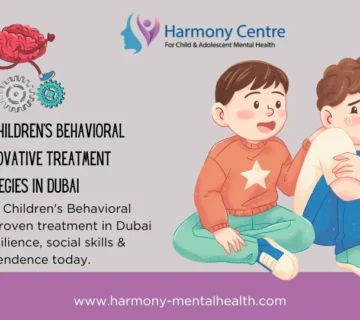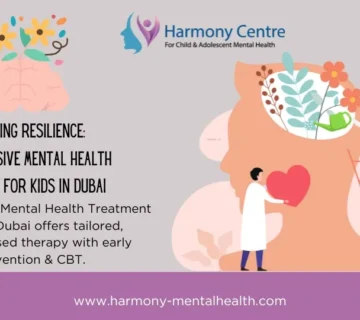Group Therapy Adolescents Dubai: Fostering Peer Support and Community Connections at Harmony Centre
Explore group therapy for adolescents in Dubai at Harmony Centre. Our evidence‑based sessions foster peer support, build social skills, and promote resilient adolescent mental health.
Contact Information
| Contact Method | Details |
|---|---|
| Phone | +971 (52) 8773268 / 04 558 2015 |
| Click Here | |
| info@harmony-mentalhealth.com | |
| Address | Office 409, Building Alrazi-64C, 26th St, Healthcare City, Dubai |
Introduction
In the vibrant city of Dubai, adolescents face unique challenges—ranging from academic pressure to social isolation—that can impact their mental health and overall well‑being. At Harmony Centre Mental Health Dubai, we recognize that no adolescent should face these challenges alone. Our group therapy sessions for adolescents offer a safe, structured space where young people can share experiences, build supportive relationships, and develop the skills needed to navigate life’s complexities. Through evidence‑based techniques and a supportive peer environment, our group therapy fosters emotional growth and resilience in a culturally sensitive setting.
Learn More About Harmony Centre • Contact Us
Understanding Group Therapy for Adolescents
What Is Group Therapy?
Group therapy is a therapeutic modality that brings together individuals facing similar challenges in a guided, supportive setting. For adolescents, it creates an environment where they can:
- Share personal experiences without judgment.
- Gain insights from peers who understand their struggles.
- Learn coping strategies through interactive discussions and activities.
The Role of Peer Support
Peer support is a vital component of group therapy. Adolescents often feel isolated in their experiences, and being part of a group can help them realize they are not alone. This shared understanding encourages:
- Empathy: Young people learn to understand and relate to the feelings of others.
- Validation: Hearing similar experiences helps normalize their emotions.
- Motivation: Seeing peers make progress can inspire individual growth and commitment to therapy.
How Group Therapy Differs from Individual Therapy
While individual therapy focuses on personal challenges in a one-on‑one setting, group therapy offers:
- Social Interaction: Opportunities to build friendships and learn social skills.
- Diverse Perspectives: Exposure to different viewpoints and coping strategies.
- Cost‑Effective Care: Group sessions often allow for a broader reach, benefiting more individuals simultaneously.
The Benefits of Group Therapy for Adolescents
Enhancing Social Skills
Group therapy provides a natural setting for developing and refining social skills. Adolescents learn:
- Effective Communication: Sharing thoughts and feelings in a respectful manner.
- Conflict Resolution: Addressing disagreements constructively.
- Active Listening: Valuing others’ perspectives and responding empathetically.
Building Emotional Resilience
Participating in group therapy empowers adolescents to:
- Express Emotions: Safely explore and articulate feelings they might find difficult to express individually.
- Develop Coping Strategies: Learn practical tools and techniques to manage stress, anxiety, and depression.
- Gain Confidence: Peer feedback and mutual support boost self‑esteem and foster a sense of accomplishment.
Reducing Isolation
Many adolescents feel isolated in their struggles. Group therapy offers:
- Community Connection: A sense of belonging and shared identity among peers.
- Mutual Support: The opportunity to support others and receive encouragement in return.
- Normalization of Experiences: Realizing that others face similar challenges reduces feelings of loneliness and stigma.
Academic and Behavioral Improvements
When emotional challenges are addressed, adolescents often experience:
- Improved Focus: Reduced anxiety and stress lead to better concentration in academic settings.
- Enhanced Behavior: Learning effective coping strategies can result in more positive behavior both in and out of the classroom.
- Increased Engagement: A supportive peer network encourages active participation in school and extracurricular activities.
How Harmony Centre Implements Group Therapy
Comprehensive Initial Assessments
At Harmony Centre, our approach begins with a thorough assessment of each adolescent’s mental health needs. Our process includes:
- Standardized Testing: We use validated tools to evaluate cognitive, emotional, and behavioral functioning.
- Direct Observations: Clinicians observe interactions in various settings to gain a holistic view.
- Parental and Educator Feedback: Input from families and teachers helps us tailor the group therapy experience.
Tailored Group Therapy Sessions
Our group therapy sessions are designed to address the unique challenges faced by adolescents in Dubai. Key features include:
Structured Sessions
- Clear Objectives: Each session has defined goals, such as improving communication or building coping skills.
- Guided Discussions: A trained therapist facilitates discussions, ensuring that every participant has a voice.
- Interactive Activities: Activities like role‑playing, group games, and creative projects promote active participation and practical learning.
Evidence‑Based Techniques
We integrate proven therapeutic methods, including:
- Cognitive Behavioral Techniques: Helping participants identify and challenge negative thought patterns.
- Mindfulness Practices: Incorporating exercises such as deep breathing and guided meditation to reduce stress.
- Social‑Emotional Learning (SEL): Teaching essential skills for emotional regulation and interpersonal communication.
Ongoing Monitoring and Feedback
Regular follow‑up sessions and continuous data collection ensure that the group therapy remains effective. Our multidisciplinary team reviews progress and adjusts strategies as needed, ensuring that every adolescent benefits from a personalized approach.
Learn More About Our Group Therapy Programs
Get in Touch
Real-Life Success Stories
Transformative Peer Support
One group participant, a 15‑year‑old student, shared how joining group therapy helped him overcome feelings of isolation. Initially struggling with social anxiety and low self‑esteem, he learned valuable communication and coping skills through group discussions. Over time, his confidence grew, and he became more engaged in school and extracurricular activities.
“Group therapy gave me a sense of belonging. Knowing that others faced the same challenges helped me feel less alone and more understood.”
– Teen Participant
Improved Social and Academic Performance
Another success story involves a group that focused on building social skills and managing academic stress. Through collaborative activities and guided discussions, participants reported enhanced focus in class, better interpersonal relationships, and a significant decrease in stress levels. Parents and teachers noted a marked improvement in behavior and academic performance, highlighting the effectiveness of the group therapy approach.
“Our daughter has become more confident and communicative since joining the group. Her teachers say she is more engaged and less anxious, which has positively impacted her grades.”
– Parent Testimonial
These stories underscore the powerful impact of group therapy on adolescent mental health, demonstrating how a supportive peer environment can catalyze meaningful change.
Practical Strategies for Maximizing Group Therapy Benefits
For Adolescents
Engage Actively in Sessions
- Share Openly:
Participate in discussions and share your thoughts and feelings honestly. Your experiences can help others, and you may gain new insights. - Embrace Feedback:
Listen to feedback from peers and therapists. Constructive criticism can be a valuable tool for personal growth. - Set Personal Goals:
Establish clear, achievable goals for what you hope to gain from group therapy, such as improved communication skills or reduced anxiety.
Practice Social Skills Outside of Sessions
- Join Extracurricular Activities:
Participate in clubs, sports, or arts programs to build social connections. - Volunteer for Group Projects:
Engage in group projects at school to practice teamwork and leadership. - Reflect on Experiences:
Keep a journal to document what you learn during sessions and how you apply those skills in real-life situations.
For Families
Support Your Child’s Participation
- Encourage Consistent Attendance:
Ensure your child attends group therapy sessions regularly. - Discuss Session Insights:
Talk with your child about what they learned and how they felt during group sessions. Offer encouragement and support. - Collaborate with Therapists:
Attend parental workshops and consultations to learn strategies for reinforcing group therapy benefits at home.
Create a Nurturing Environment
- Establish Routines:
Develop consistent daily routines that align with the therapeutic strategies discussed in group therapy. - Foster Open Communication:
Encourage your child to express their feelings and share their experiences openly with family members. - Celebrate Progress:
Acknowledge and celebrate improvements in behavior, social interactions, and academic performance.
For Educators
Integrate SEL Programs
- Implement Social‑Emotional Learning:
Use classroom activities that mirror the strategies taught in group therapy, such as role‑playing and collaborative projects. - Monitor Student Engagement:
Regularly check in with students to assess their progress and provide support where needed. - Facilitate Peer Interactions:
Create opportunities for students to work together on projects that promote social skills and teamwork.
Collaborate with Parents and Therapists
- Regular Communication:
Maintain open lines of communication with parents and mental health professionals to ensure that strategies are consistent across school and home. - Individualized Support:
Develop Individualized Education Plans (IEPs) that incorporate insights from group therapy sessions, helping students apply these skills in the classroom.
Frequently Asked Questions about Group Therapy Adolescents Dubai
Book a Consultation Now
Contact Information
Office Address:
Office 409, Building Alrazi-64C, 26th St, Umm Hurair 2, Dubai Healthcare City, Dubai
Phone:
+971 4 558 2015
+971 5 287 73268
Email:
info@harmony-mentalhealth.com
Final Thoughts about Group Therapy Adolescents Dubai
Group therapy provides adolescents with a supportive environment where they can connect with peers, share experiences, and learn practical coping strategies. At Harmony Centre Mental Health Dubai, our evidence‑based group therapy sessions foster resilience, improve social skills, and promote lasting emotional well‑being. By integrating family and educator support into our holistic approach, we create a seamless network of care that empowers every young person to thrive.
Choose Harmony Centre for group therapy in Dubai and invest in a future where your child feels understood, supported, and empowered to succeed in every aspect of life.
Learn More About Harmony Centre
Get in Touch
👉 Book a Consultation Now: Call +971 4 558 2015
Join our online community and stay updated with our latest events, articles about Group Therapy Adolescents Dubai



